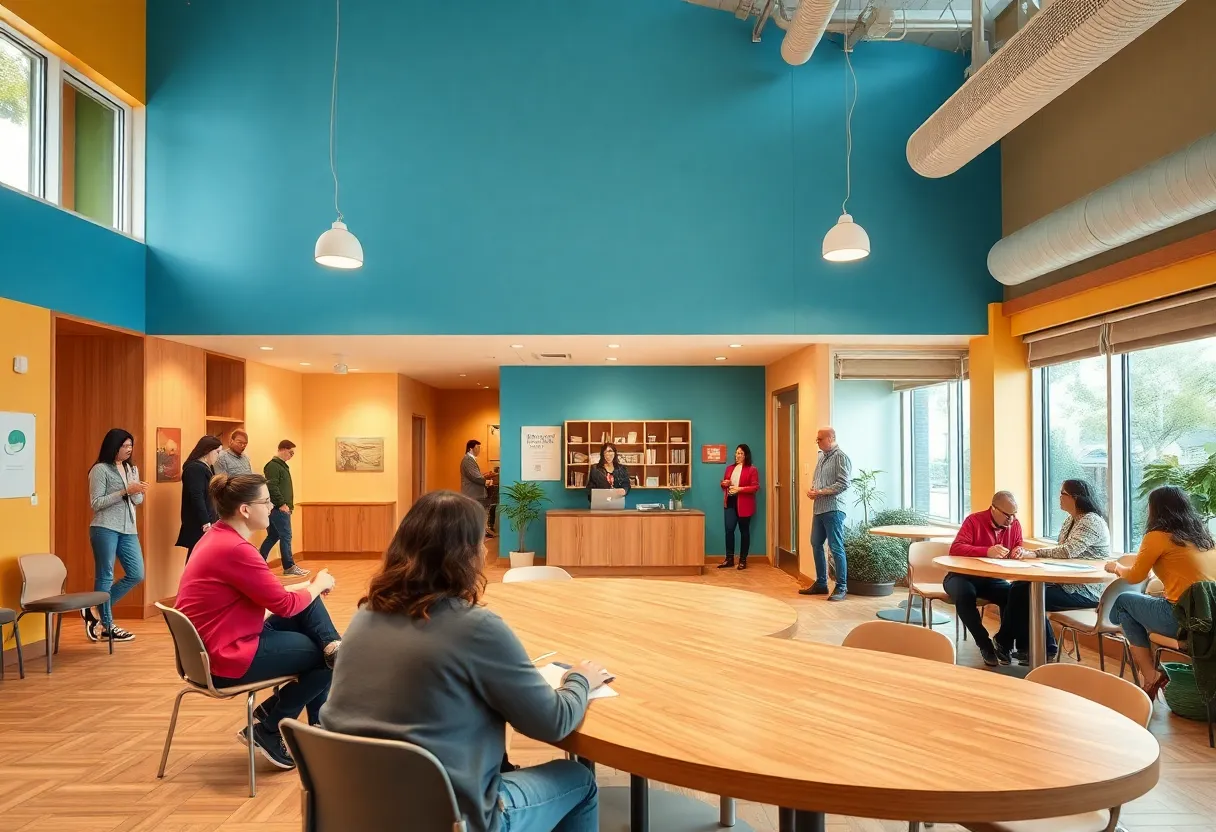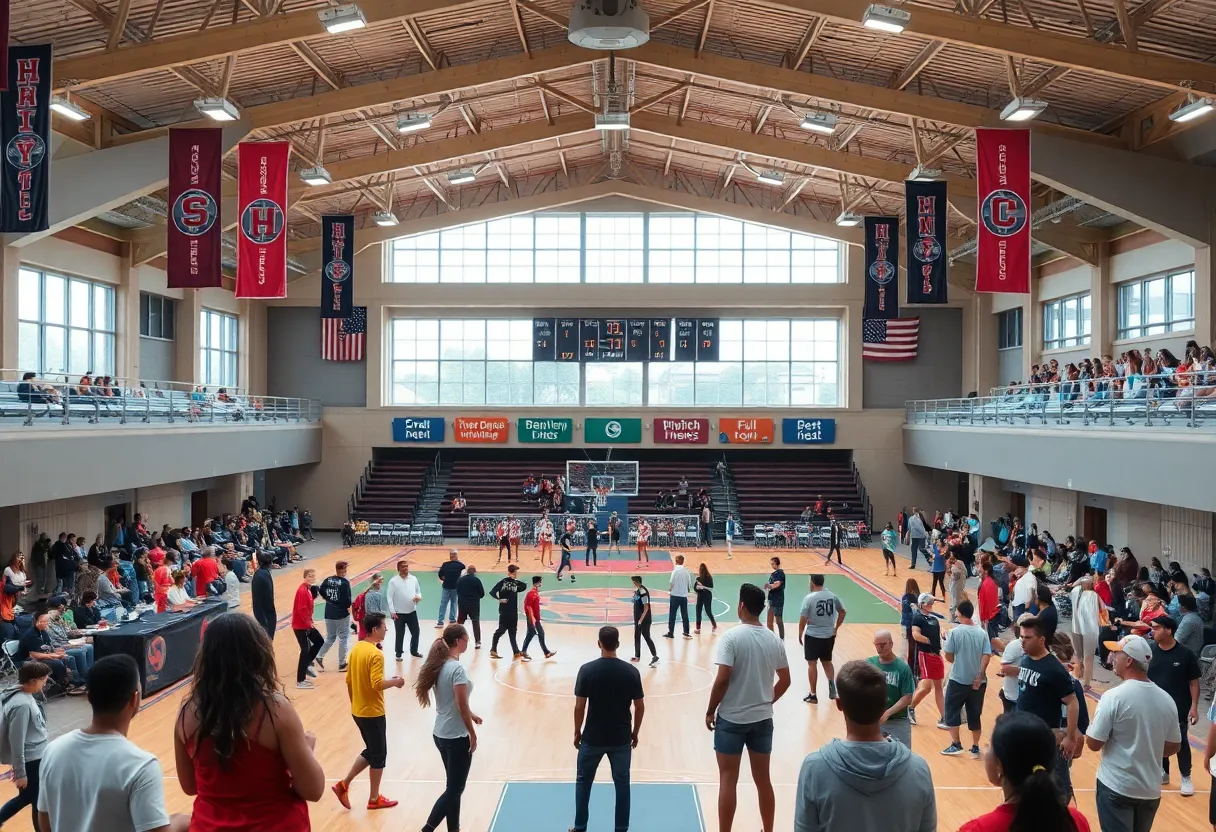Oklahoma City, October 18, 2025
Oklahoma City has announced the expansion of its Diversion Hub program into three additional neighborhoods, focusing on combating poverty and recidivism. The initiative aims to offer support services such as housing assistance, job training, and mental health support, funded by a $5 million federal grant. This strategic move hopes to prevent at-risk individuals from entering the criminal justice system while continuing to reduce reoffense rates significantly. The expansion will prioritize homeless veterans and at-risk youth in the targeted areas.
Oklahoma City Announces Expansion of Diversion Hub Program to Combat Poverty and Incarceration
Oklahoma City has unveiled plans to expand its Diversion Hub initiative to three additional neighborhoods, targeting deeper interventions in poverty and recidivism. The program, aimed at at-risk individuals, will use a $5 million federal grant to enhance services like housing assistance, job training, and mental health support. This move comes as the hub marks significant success since its inception, with over 1,200 people diverted from jails and a 35% drop in reoffense rates.
The expansion focuses on connecting participants with resources before they enter the criminal justice system, emphasizing prevention over punishment. Services will roll out starting in November, with partnerships between local nonprofits to increase outreach efforts. Northeast Oklahoma City stands out as one of the key areas, where the program will prioritize homeless veterans and at-risk youth. This strategic growth builds on the hub’s established model, which has proven effective in breaking cycles of poverty and repeated incarceration.
Core Services and Expansion Details
At its heart, the Diversion Hub operates as a one-stop center for individuals facing potential arrest or legal troubles due to economic hardship or mental health issues. Instead of immediate jail time, participants receive immediate support to stabilize their lives. The new funding will allow the program to scale up these offerings, ensuring more people in high-need communities gain access.
The three selected neighborhoods will see tailored programs. For instance, in Northeast OKC, efforts will include specialized counseling for veterans experiencing homelessness and educational workshops for young people at risk of involvement in the justice system. Nonprofits involved will handle community engagement, from door-to-door awareness campaigns to on-site service fairs. This collaborative approach aims to reach underserved populations who might otherwise fall through the cracks.
Job training components will cover skills for in-demand local industries, such as construction and customer service, while housing assistance will link participants to affordable options and rental aid. Mental health services, including therapy and substance abuse support, round out the comprehensive package designed to foster long-term stability.
Proven Impact Since Launch
Launched in 2020, the Diversion Hub has already made measurable strides in Oklahoma City. By intervening early, it has successfully kept more than 1,200 individuals out of jail, allowing them to address root causes like unemployment and untreated health issues. The program’s effectiveness is evident in its 35% reduction in reoffense rates, a statistic that underscores its role in reducing the burden on local jails and promoting community reintegration.
Prior to the expansion, the hub operated in central areas of the city, serving a diverse group including those dealing with minor offenses tied to poverty. Data from these initial years shows participants not only avoid re-arrest but also secure employment and housing at higher rates than similar non-program groups. This track record has positioned the initiative as a model for other urban areas grappling with similar challenges.
City Leadership’s Perspective on the Initiative
Local officials have described the expansion as a pivotal step forward in addressing systemic issues. The $5 million federal grant, secured through competitive funding channels, reflects growing national recognition of community-based alternatives to incarceration. By targeting specific demographics like homeless veterans and youth, the program aligns with broader goals of equity and public safety.
The rollout in November will involve training for hub staff and partners to ensure seamless service delivery. Community input gathered during planning phases helped shape the expansion sites, ensuring they address the most pressing local needs. As Oklahoma City moves ahead, the Diversion Hub is set to amplify its influence, potentially serving hundreds more residents and contributing to a safer, more inclusive urban environment.
This development arrives amid ongoing discussions about criminal justice reform, where preventive measures like the hub are gaining traction. With its focus on holistic support, the program illustrates a shift toward sustainable solutions that benefit both individuals and the wider community.
Background on the Diversion Hub Model
The Diversion Hub concept originated as a response to overburdened jail systems and rising poverty rates in urban centers. In Oklahoma City, it was implemented to divert low-level offenders from traditional processing, offering alternatives that tackle underlying problems. Since 2020, the hub has evolved through iterative improvements, incorporating feedback from participants and service providers.
The expansion to three new neighborhoods represents a natural progression, extending the program’s footprint without diluting its core principles. Funded by the $5 million federal grant, it ensures resources match the increased demand. Partnerships with nonprofits will be crucial, providing expertise in areas like veteran support and youth development.
Looking ahead, the initiative’s success will likely influence policy at state and national levels, highlighting the value of upfront investment in social services. For residents in the targeted areas, this means greater access to tools for self-sufficiency, ultimately aiming to lower incarceration numbers and uplift entire communities.
In total, the Diversion Hub expansion underscores a commitment to innovative, compassionate approaches in public policy. By focusing on prevention and support, Oklahoma City is paving the way for reduced recidivism and enhanced quality of life for many of its citizens.
FAQ
What is the Diversion Hub program?
The Diversion Hub is a pioneering program tackling poverty and recidivism that connects at-risk individuals with housing, job training, and mental health services before incarceration.
When was the Diversion Hub launched?
The Diversion Hub was launched in 2020.
How many people has the Diversion Hub diverted from jails?
Since 2020, the Diversion Hub has diverted over 1,200 people from jails, reducing reoffense rates by 35%.
What funding supports the expansion?
The expansion is funded by a $5 million federal grant.
Which areas are included in the expansion?
Expansion sites include Northeast OKC, focusing on homeless veterans and youth.
When will the expansion services start?
Partnerships with nonprofits will boost outreach starting November.
Key Features of the Diversion Hub Program
| Feature | Description |
|---|---|
| Launch Year | 2020 |
| People Diverted | Over 1,200 from jails |
| Reoffense Reduction | 35% |
| Expansion Funding | $5 million federal grant |
| Core Services | Housing, job training, mental health services |
| Focus Areas | Northeast OKC, homeless veterans, youth |
| Outreach Start | November |
Deeper Dive: News & Info About This Topic
HERE Resources
Oklahoma City Hosts Free Health Day for Residents





